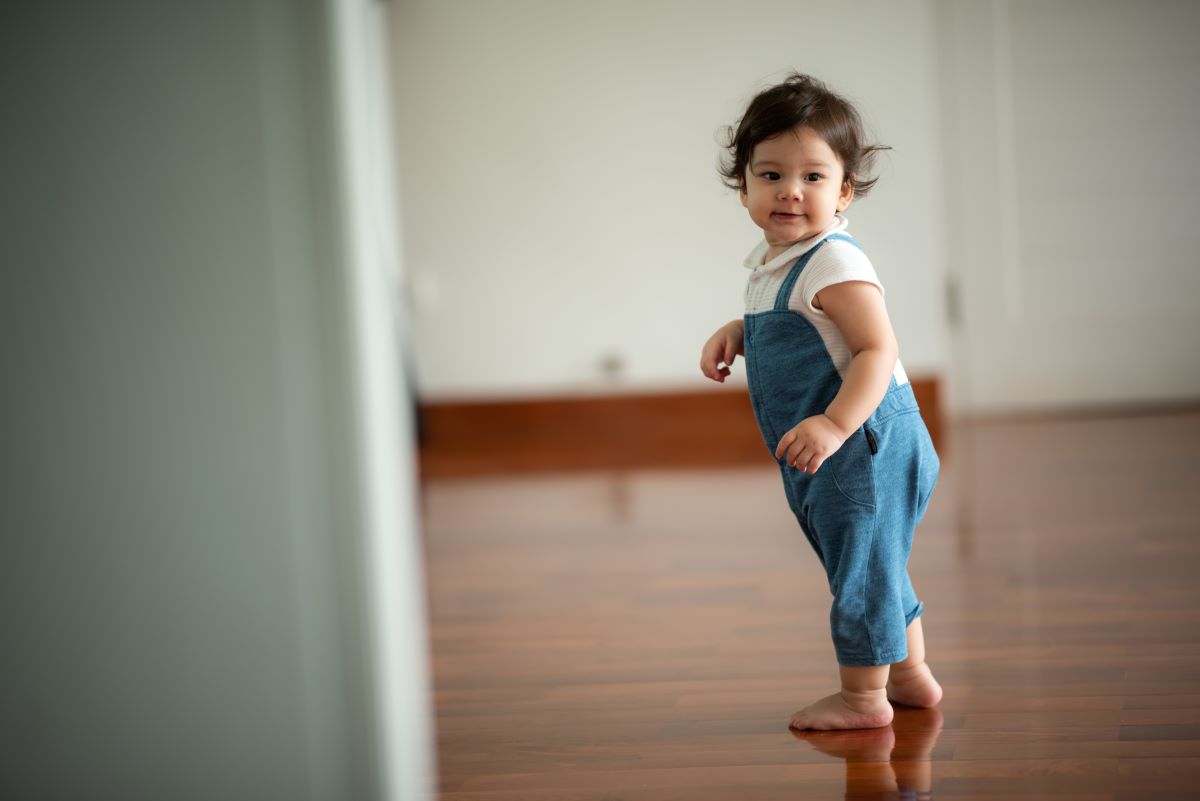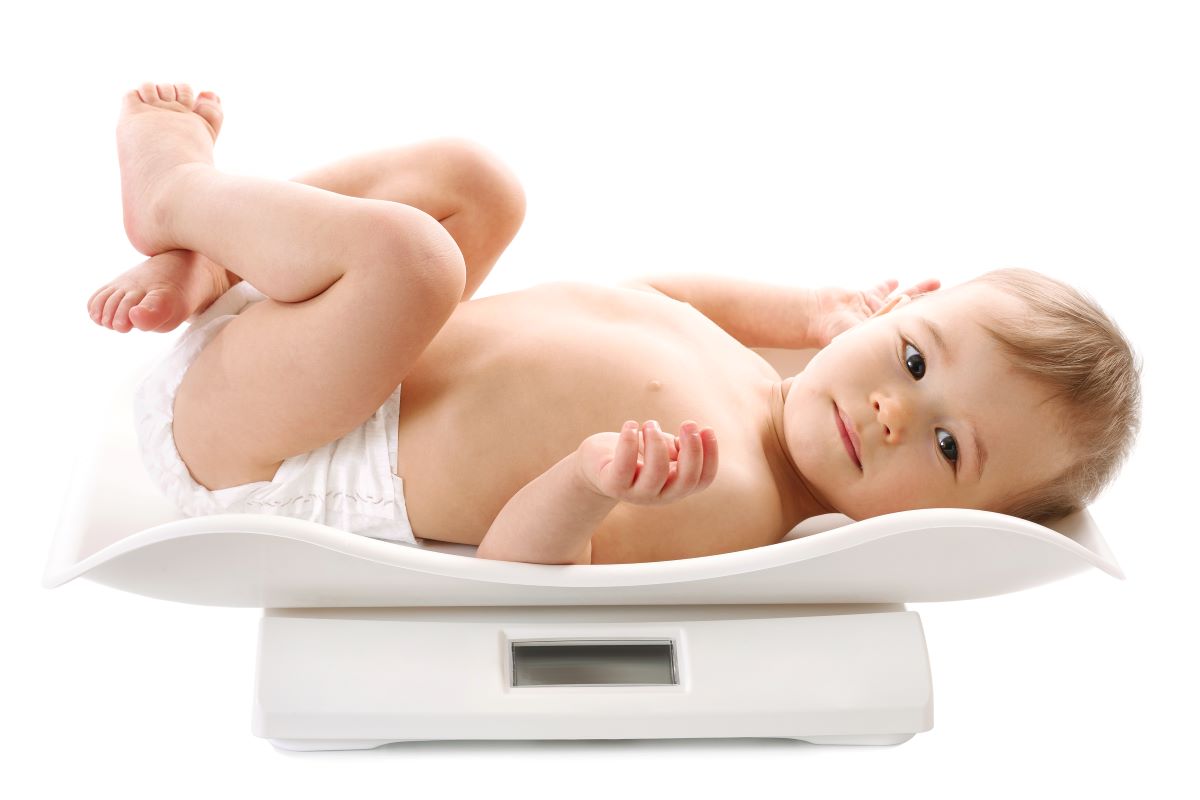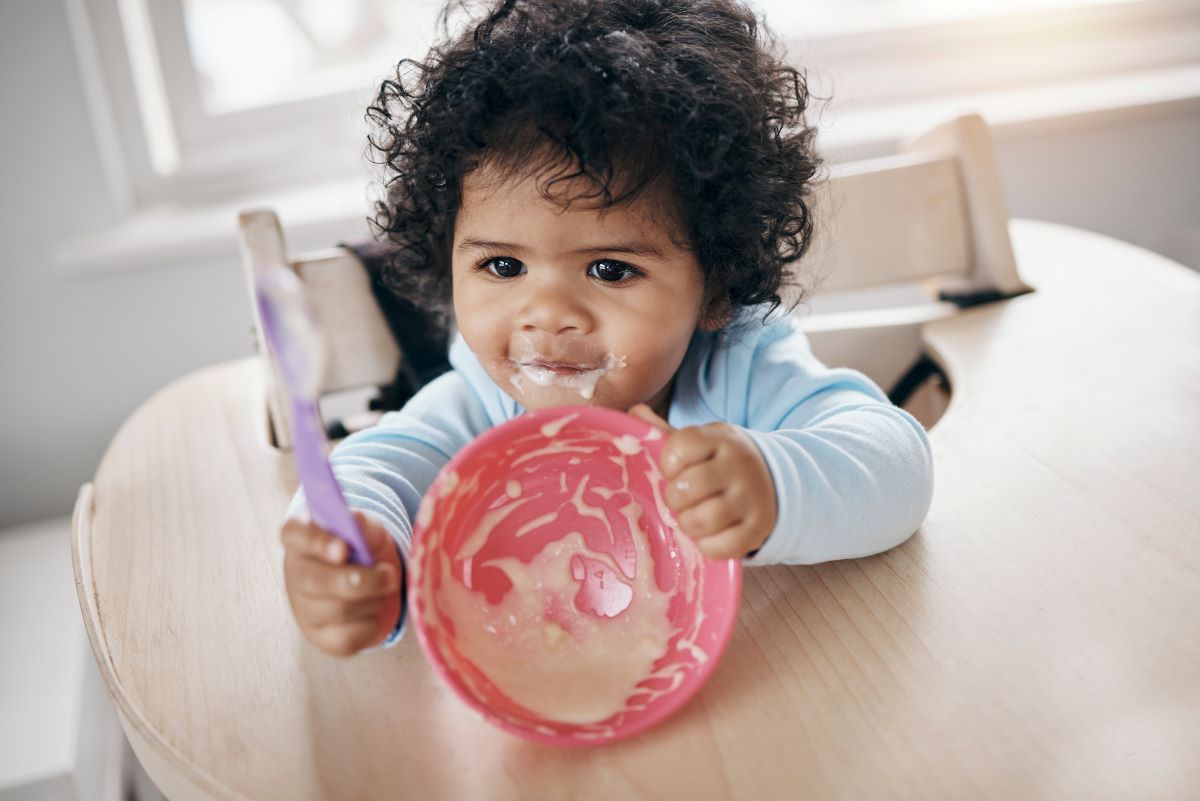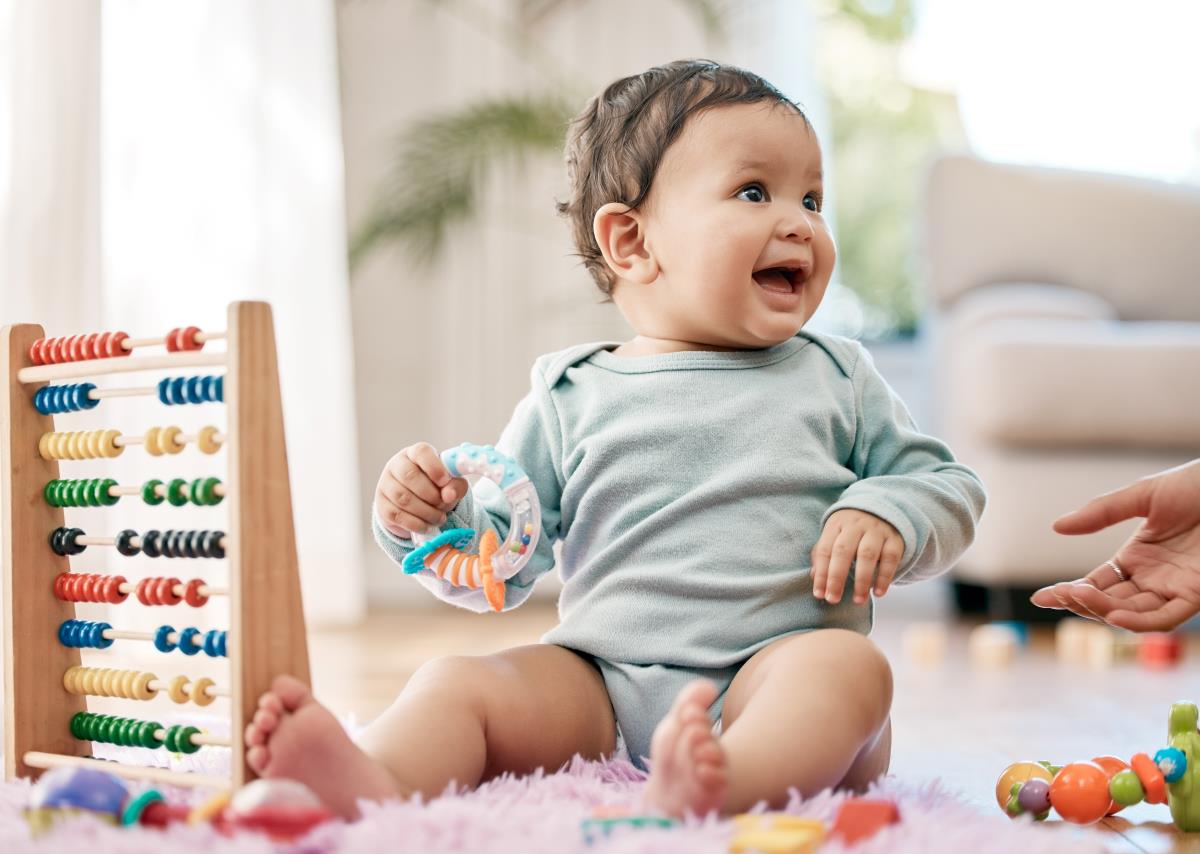Simplifying Life Insurance in India
11 Developmental Milestones of a 14 Month Old Baby

Watching a baby grow is a fulfilling process, especially when your baby grows from infant to toddler. Understanding their wants and needs is imperative because, at this stage, they become assertive and make demands in their baby language. At this stage, they need autonomy to grow and feel independent.
At 14 months of age, babies are bound to reach some milestones, and you shouldn't be surprised if they do. Look out for essential markers in their behaviour to identify any developmental issues. If you are concerned about your child's growth, read this article to learn about the fourteen month developmental milestones.

Table of Contents

What Most Babies Do by 14 Months?
By 14 months, most babies have made significant progress in many areas of development. Physically, most can walk independently or with support, with marked improvement in coordination and balance. Cognitive abilities make them curious about how things work, develop problem-solving skills, and explore the world around them.
Feeding skills also improve, so babies can feed themselves, albeit not very successfully while experimenting with various foods. Overall, 14 months is a lively period of growth and development when babies reach their 14th month developmental milestones and learn about the surrounding environment while developing skills.
14 Month Milestones & Development Checklist
1. Movement Milestones For a 14 Month Old Baby

Movement Milestones for a 14 month old:
- Walking independently: Most babies walk independently, though some do not. However, most are showing much more balance and coordination.
- Climbing: They even try climbing the furniture or the stairs with much more strength and curiosity.
- Squatting: Babies squat down in an attempt to pull some toys towards themselves and move back up to a stand.
- Transferring Objects: These babies can quickly transfer objects from one hand to another, which definitely builds the baby's fine motor skills.
- Cruising: Some will still cruise around the furniture as they get around their surroundings.
- Starting to Run: Though unsteady, most babies will try to run or run with less stability in short, fast intervals.
- Kicking a Ball: They will start kicking a small ball and display coordination and control.
2. Visual and Hearing Milestones For a 14 Month Old Baby

Visual Milestones:
At 14 months old, babies undergo significant developments in their visual capabilities while enhancing interaction with their environment. Here are the key visual milestones at this age:
- Can better judge distances while walking and climbing.
- Tracks moving objects with the eyes without any hesitation.
- Identifies known faces easily and appropriately reacts to them.
- Shows interest in investigating surroundings and carefully looking at new objects.
- Usually begins an interest in picture books, where often they point at a picture and comment on it.
Hearing Milestones:
At 14 months, babies also make tremendous strides in their hearing skills, which are responsible for so much of their communication and social behaviour. Below are the essential hearing skills in babies at this age:
- Rotates their head to sounds, meaning they can locate them better.
- They hear and usually respond to their names when called.
- Respond to simple verbal commands like "Come here."
- Plays with babble and imitation of nonspeech sounds.
3. Smell and Touch Milestones For a 14 Month Old Baby

Smell Milestones:
At 14 months old, babies can smell, or better be able to smell the several smells that surround them so they may explore and identify those around them.
- Infants can differentiate the smells and develop a liking for familiar smells, such as those of parents or favourite food.
- The infants can smell objects favourably or unfavourably. They can identify and respond to odours.
- Infants rely on their olfactory environment to discover their world, which forms curiosity and interest in their environment.
Touch Milestones:
At fourteen months of age, babies have also developed some amazing features in their touch sense, wherein they can perceive, become accustomed to and learn about the surroundings in more ways.
- With increased control and agility, babies can better grip toys, food, etc., showing an increase in grasping and holding capabilities.
- A baby will use his touch to learn the world; most babies bring things to their mouths to fully understand them.
- Most babies will seek out a soft, familiar toy or favourite blanket to comfort them, and that's an emotional attachment to that feeling.
4. Sleep Milestones For a 14 Month Old Baby

Sleep Milestones for a 14 month old:
- Babies typically sleep about 11 to 14 hours, with fewer awakenings at night.
- One or two naps, totalling about 2 to 3 hours a day, are usually seen in the morning and evening.
- Many babies will learn to self-soothe themselves back to sleep if they awaken at night.
- As they become less accustomed to napping and staying asleep through the night, they may need less sleep time.
5. Health Milestones For a 14 Month Old Baby

Regular check-ups with a paediatrician can provide further insights into your child's growth patterns.
6. Feeding Milestones for a 14 Month Old Baby

Feeding Milestones for a 14 month old:
- Self-feeding: Most babies use a spoon or fork with reasonable success or prefer to feed themselves.
- Diet: They can now have a large amount of food from the list below, including soft table foods, fruits, vegetables, and protein foods.
- Drinking: Most of them can now drink from a sippy cup or an open cup with some assistance.
- Chewing Skills: Improved chewing means that they can accept more textured foods. Introduce them to mildly hard foods.
- Food Preference: They may develop preferences for certain foods and refuse others according to their taste.
- Engagement in Family Meals: Rising interest in mealtime rituals and possibly will sit down to dine with family.
7. Schedule and Routine Milestones For a 14 Month Old Baby

Here is the daily routine for a 14 month old baby, along with a milestone in the routine:
8. Cognitive Milestones For a 14 Month Old Baby

Here are key cognitive milestones for a 14 month old:
- Exploration: Interest in objects is increased; however, that interest becomes the desire to play with them, figure out how they work, and manipulate them.
- Simple Problem-Solving: Start solving simple problems, such as retrieving a partially inaccessible toy.
- Following Simple Directions: Following simple instructions, like "Come here" or "Give me the ball."
- Familiar Faces: Being able to distinguish between familiar and unfamiliar individuals, often, then clinging to the familiar ones.
- Categorisation: Grouping objects into similar categories, such as toys or animals, based on their specific characteristics.
9. Social and Emotional Milestones For a 14 Month Old Baby

Here are key social milestones for a 14 month old:
- Attachment to Caregivers: Spend more time with known caregivers, and they can begin looking to them for comfort when new situations arise.
- Separation Anxiety: A child may also become distressed at times of separation from the parents or caregiver.
- Compressing Emotions: They now exhibit a variety of emotions like happiness, frustration, or shyness.
- Knowledge of Simple Social Rules: They begin to understand the turn-taking of play or sharing playthings.
10. Language and Speech Milestones For a 14 Month Old Baby

Language and Speech Milestones Development for a 14 month old:
- First Words: Babies should utter some of their first recognisable words, usually "mama" or "dada," and may use them intentionally.
- Lexical Growth: Most will come with a vocabulary of 1 to 3 words and know hundreds more.
- Imitation of Sounds: They mostly imitate what they hear in the form of sounds, gestures, and simple phrases.
- Nonverbal Communication: Gestures such as pointing or waving to express needs or interests.
- Concern for Books: A more significant concern for books is that they will show a keen interest in poring over pictures, flipping through pages, etc.
11. Play Milestones For a 14 Month Old Baby

Play Milestones for a 14 month old:
- They enjoy mimicking what they see others do, like pretending to talk on a phone or feeding dolls.
- They try out their toys and find out how to put the shapes into shape sorters or stack blocks.
- Use objects to represent what they are used for, such as using a toy car to drive or using a block as a phone.
- Show more interest in playing with other children, though not necessarily interacting actively.
- Begin to learn that an action brings about a response, such as pushing a button to create a sound.
What are the Developmental Activities For a 14 Month Old?
1. Play using Senses
Sensory play is a fantastic way to engage your 14 month old and develop their senses. Pour water into a small tub and provide cups, spoons, and floating toys for your child to splash and pour. This is not only fun for them but also develops fine motor abilities.2. Stacking and Building
Stacking and building activities are exercises for your child's fine motor muscles and hand-eye coordination. Use soft blocks or stacking cups to challenge your child to build towers and then knock them over. This teaches cause and effect and spatial awareness.3. Art and Craft Activities
This is your child's introduction to these activities. For instance, give them some colours to play around with through finger painting on paper or a washable surface. That's great for keeping their fingers busy through this proper sensory exercise that enables motor activity.4. Interactive Books
Interactive books can be fun and educational. Excellent look-and-feel books, where your child can feel the different textures while reading to one another, can be significant. These help them extend their sensory experience and vocabulary.5. Musical Activities
Musical activities are enjoyable and help promote auditory development. Giving your child simple instruments, like shakers, tambourines, or xylophones, will introduce them to various sounds and rhythms. Playing with them will enhance their interest in music.6. Outdoor Exploration
Outdoor exploration is an excellent way for your child to bond with nature. Take short walks; let your child touch and feel the leaves, flowers, and grass. Such interaction develops sensory skills and curiosity about the environment.7. Pretend Play
Encourage pretend play to help your child develop social skills and creativity. Supply dolls or stuffed animals for your child to care for; these will help encourage nurturing behaviours. Create a small play kitchen and fill it with safe pots and pans to inspire imaginative cooking.8. Movement Activities
It helps develop physical skills and coordination. Develop a simple obstacle course with pillows, boxes, and soft toys so the child can climb, crawl, and pass through it. This fun challenge helps the child's motor skills and balance.9. Jigsaw Puzzles
Simple jigsaw puzzles are an excellent activity to stimulate brain development and hand-eye coordination. Use chunky wooden puzzles with big pieces that fit into a board, encouraging your child to use their problem-solving skills by working out where each piece fits.10. Play Interaction
Playing interactive games is enjoyable and learning. Play simple hide-and-seek with toys or family members to teach your child the concept of object permanence. This game is helpful for social activity and develops cognitive skills in a child.11. Nature Art
Nature art is a creative exploration where your child can interact with his environment. Come outside with your child to collect leaves, flowers, and small twigs. Bring them indoors and give them some paper and non-toxic glue to create their picture using the gathered natural items.12. Simple Hide and Seek
Playing a simple game of hide-and-seek can be a way to entertain while teaching your child. Let your child look for a favourite toy or a small object hidden in an easy-to-find place. Then, once they get the hang of it, you and your child take turns hiding and seeking.Safety Tips For a 14 Month Old Baby
Knowing that you have a moving child who is curious about everything in the surroundings makes the need for safety tremendously crucial. Here are some essential safety tips on how to keep a 14 month old baby safe:
Savings & Protection Options for Your Child
How to Support a Baby's Development at 14 Months?
1. Encourage Physical Activity
Provide a safe environment for your child to wander, crawl, and climb. Encourage them to explore with push toys and balls to heighten their gross motor skills. A favourite song or game that keeps them moving will facilitate further coordination and strength development.2. Encourage Language Development
Engage your child's language skills by reading together daily. Follow colourful and interactive books by pointing to pictures while naming objects. Sing songs and rhymes for developing languages so it doesn't become monotonous work.3. Developing Cognitive Skills
Toys like shape sorters and stacking blocks can introduce problem-solving play. These activities provoke critical thinking in your child. Games like hide-and-seek with toys also provoke cognitive growth as the child learns about object permanence.4. Foster Social Interaction
Then, you should also arrange playdates with friends who will coach your child on critical social behaviours, such as sharing and cooperation. Similar attention should be placed on interactions in the family; interchange the varied family members you will play.5. Develop Emotional Intelligence
This is important because a child always responds to their feelings, and you should be able to respond to your child's emotions with care and sensitivity. Perform regular activities such as meals and naps consistently to facilitate predictability and security.6. Independent Experience Opportunities
Encourage self-feeding with finger foods to foster independence and fine motor skills. Offer simple choices, such as selecting between two toys or snacks, to empower your child and promote decision-making skills.7. Engage in Creative Play
To foster creative imagination, do many arts and crafts, like finger painting or colouring. Playing with dolls or a play kitchen lets your child see themselves in other roles and experiences, which makes them more imaginative thinkers.8. Enact Good Behaviour
Enact good behaviours and skills that the child learns through observation and imitation. You can enact sharing, taking turns, and other kinds of kindness. This process embeds all the essential values and social skills in the child.9. Limit Screen Time
Though some screen time can be educational, it should always be appropriate for age and quantity limits. Co-view with your child to better understand what they are watching and create an active viewing experience.10. Monitor Growth and Development Signposts
The paediatric follow-up appointment is the best moment to monitor growth and development. You can use these appointments to voice concerns about your child's growth and development.When to Talk to the Paediatrician?
Delayed Milestones:
Discuss with the paediatrician if your child will not walk alone, doesn't use words, or does not interact with others by 14 months.Avoidance of Eye Contact:
This could be a developmental sign if the infant rarely makes eye contact and is indifferent to social interactions.Uninterested in Playing:
If your child shows little interest in playing with toys or getting involved in typical play activities for their age.Behavioural Problems:
If your child's behaviour is extreme, like yelling or tantrums that last for more than a bit, which is not typical for their age group.Feeding Disorders:
If your child has a food aversion and does not eat most foods, he cannot feed himself.Sleep Disorders:
If your child persists with sleep disorders like insomnia, wakeful episodes in sleep, or excessive daytime sleepiness.Physical Health Problems:
Chronic condition indicators include frequent infections, unusual fatigue, or developmental 'regressions'.FAQs about 14 Month Developmental Milestones
What are the significant physical developments I would expect at 14 months?
What is language development at the 14 month old stage?
What social skills should my 14 month old baby demonste?
Is my 14 month old usually fussy and clingy?
What cognitive skills should my baby have at 14 months?
What can be done to encourage language development in my 14 month old?
What kinds of play are safe and appropriate for a 14 month old?
Should I be concerned if my 14 month old baby isn't walking yet?
How can I support my 14 month old baby's emotional development?
What are some indicators of delayed development at 14 months of age?
Why is routine important for a 14 month old?
How can I encourage independence in my 14 month old?
How do I know if my baby is developing socially at 14 months?
What is the regular 14 month old sleep pattern?
Important Articles about Infant Developmental Milestones




















